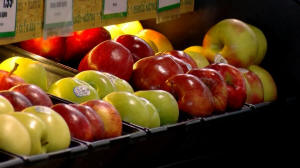Trump administration ends reimbursements for Illinois food programs
[March 05, 2025]
By Ben Szalinski
SPRINGFIELD — The Trump administration has stopped reimbursing Illinois
for a program designed to help farmers and supply fresh food to Illinois
food banks.
The Illinois Department of Agriculture announced Tuesday that changes to
federal funding mean Illinois is missing reimbursements for costs for
the Local Food Purchase Assistance Program, or LFPA, and can no longer
run the Resilient Food Systems Infrastructure Program, or RFSI.
The state agency said the federal U.S. Department of Agriculture has
told states it will not reimburse them for any costs for the programs
dating back to when Trump took office on Jan. 20.
LFPA, which funds the Illinois-EATS program, uses federal funding to buy
fresh products from farmers at a fair market value, then distributes the
food to communities via food pantries and other similar programs
designed to help people in need for no additional cost. All the food
produced as part of Illinois’ program comes from socially disadvantaged
farmers, including those the federal government defines as “new
farmers.”
More than 170 farmers have supplied food to 883 locations in Illinois
through Illinois-EATS.
Brenda Stewart, a farm owner in Pembroke Township in Kankakee County,
received grant funding through the state. She told Capitol News Illinois
she is most worried about the people who depend on her farm and the
grant program to eat healthy.
“We’re still going to grow our food, we’re still going to provide what
we can to our community, but not on the scale if they were able to
receive,” Stewart said.

Pembroke Township has no grocery store and many residents are on food
stamps, Stewart said. She said IL-EATS and her farm provide many of the
residents one of their only avenues for fresh and healthy food.
The USDA approved $43 million for Illinois to carry out the program for
several years, but the state is still missing $17.8 million, according
to the Illinois Department of Agriculture. The state and USDA announced
a partnership for the program in 2022.
The state has also not received $6.5 million for the RFSI grant program.
The program is designed to improve capacity for food processors and
distributors and improve access to better distribution markets. The
state has established a grant program based on funding from the federal
government and was in the process of selecting winners.
[to top of second column]
|

Apples at County Market in Springfield. (Capitol News Illinois photo
by Andrew Campbell)

There was no explanation for why reimbursements submitted after Jan. 19
were stopped, according to the state, and reimbursement claims have been
returned.
USDA did not return a request for comment Tuesday afternoon.
“That program made the difference, and I would say to Elon Musk and
President Trump, this is saving lives. This is teaching our babies how
to eat fresh vegetables and how it helps their medical conditions,”
Stewart said.
News that the two programs are on an indefinite hold comes a week after
Gov. JB Pritzker and Illinois’ Democratic members of Congress sent a
letter to the White House Office of Management and Budget asking why the
Trump administration was withholding $1.9 billion from Illinois state
agencies, nonprofits and businesses.
“These are federal funds that were passed by Congress, signed into law,
and promised to Illinois,” the letter stated. “State agencies, small
businesses, nonprofit organizations, and everyday citizens across
Illinois — including in rural communities — are still having trouble
accessing allocated federal funding.”
A federal judge issued another ruling last week prohibiting the Trump
administration from blocking distribution of federal funding.
The end of funding for the programs comes as Illinois farmers face new
tariffs imposed on three of the state’s largest trading partners and
retaliatory tariffs against American goods. Illinois farmers exported
nearly $14 billion of agricultural products in 2023, according to the
Illinois Farm Bureau.
“Illinois farmers’ products – from grains and feed, corn, soybeans,
ethanol, beef, pork, and more – rely on access to foreign markets and
will undoubtedly be impacted by these new tariffs either through
increased prices or decreased market access,” Illinois Farm Bureau
President Brian Duncan said in a statement. “This uncertainty coupled
with an already struggling farm economy has farmers worried as we head
into planting season.”
Capitol News Illinois is
a nonprofit, nonpartisan news service that distributes state government
coverage to hundreds of news outlets statewide. It is funded primarily
by the Illinois Press Foundation and the Robert R. McCormick Foundation. |